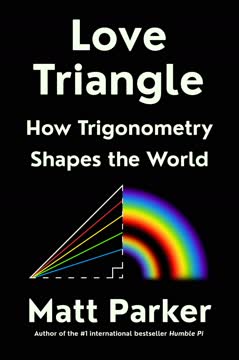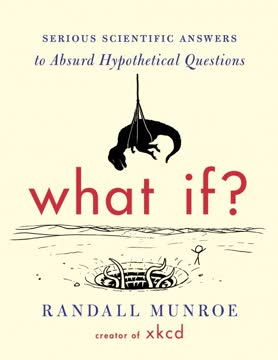Key Takeaways
1. Asking Absurd Questions Unlocks Real Science.
Trying to answer silly questions can take you through some serious science.
Curiosity drives discovery. The book explores ridiculous hypothetical questions, like filling the solar system with soup or catching a bird in a car, not just for fun but to reveal underlying scientific principles. These questions, while silly, require applying real physics, chemistry, and biology to find answers.
Serious science in silly scenarios. Concepts like triboelectric charging (why hair sticks to balloons), black hole physics, atmospheric optics (mirages), and human metabolism are explained through the lens of these absurd scenarios. The unexpected connections highlight how fundamental science applies universally, even to the most outlandish ideas.
Embrace confusion. The author encourages embracing confusion when faced with questions nobody is expected to know the answer to. This mindset allows for exploration, looking things up, and discovering that sometimes, even seemingly simple phenomena like static electricity are areas of cutting-edge research.
2. Extreme Scale Breaks Physics (and Everything Else).
If you shrink Jupiter and plop it down in the middle of your neighborhood, that hot, high-pressure hydrogen, with no gravity holding it together, would expand.
Gravity's immense power. Filling the solar system to Jupiter with soup creates a black hole extending past Uranus, demonstrating how immense mass warps spacetime. A house-sized Jupiter, freed from its own gravity, explodes violently due to its internal heat and pressure, showing that scale is crucial to stability.
Relativistic effects at speed. Speeding up Earth's rotation to a one-second day causes the equator to move at over 10% the speed of light, flinging material outward and creating an expanding disk of debris that sterilizes the solar system. This highlights how relativistic speeds fundamentally change physical outcomes.
Charge vs. Gravity. An Earth of protons and a Moon of electrons wouldn't just attract; the electrostatic repulsion within each body is vastly stronger than gravity. However, at such extreme densities, general relativity predicts the formation of black holes, demonstrating that gravity eventually wins over even immense electrostatic forces at cosmic scales.
3. Your Body is Surprisingly Fragile (and Resilient).
You wouldn’t die instantly—you might survive for a few milliseconds or even seconds.
Limits of human tolerance. The human body has surprising limits to acceleration (around 4-6 Gs sustained), cold (space is hot but you'd freeze), and heat (nanoseconds in the Sun's core are fatal). Even seemingly minor things like drinking blood can cause severe illness long before alcohol intoxication.
Vulnerability to environment. Standing near an ultracold object can condense liquid oxygen, a fire hazard. Inhaling dust, even if not mostly dead skin, is harmful to lungs. Pressure changes, whether from deep ocean dives or high-altitude suction tanks, can be fatal to marine life and dangerous to humans.
Resilience in specific contexts. While fragile in extreme scenarios, the body is resilient in specific ways. Lips don't wear away from kissing. Bones are hard to break all at once. Some jellyfish stings are harmless. The body is adapted to its typical environment, not cosmic or absurd hypotheticals.
4. Everyday Actions Ripple Outward.
Breathing all those tires probably isn’t great for us, and it’s not great for the environment, either.
Hidden environmental impact. The rubber worn off tires doesn't just disappear; it becomes microplastic pollution in air, water, and soil, impacting ecosystems and potentially human health. This highlights how common activities have widespread, often unseen, environmental consequences.
Waste heat adds up. While one open refrigerator's waste heat is negligible, billions running outdoors would significantly contribute to global warming by increasing CO2 emissions from power generation. Even seemingly small, inefficient actions scale up globally.
Absurd weather events. A global snowfall of six feet would require 10^23 snowflakes and bury cities. A rain of lemon drops and gumdrops would be a catastrophe, burying infrastructure, causing global drought, and potentially triggering a runaway greenhouse effect from the sheer volume of sugar.
5. Space is Mostly Empty, But Still Dangerous.
Even if you flew through edge-on, so you spent as much time as possible in the dense galactic disk, your odds of hitting a star would be only about 1 in 10 billion.
Vastness and emptiness. The Milky Way is so vast that flying blind through it gives you only a 1 in 10 billion chance of hitting a star. This emphasizes the incredible emptiness of space compared to our intuition.
Distant but influential objects. Despite the distance, massive objects like the Sun exert significant gravitational pull, vastly outweighing the collective pull of all spiders on Earth. Distant black holes like Cygnus X-1 are cool to "own" in hypothetical airspace, but their influence is negligible at Earth distances.
Unexpected hazards. Even in the vacuum, quantum fluctuations might blur vision for a massive Earth-sized eye. Falling anvils from space reach terminal velocity, which is still lethal. Stars, if you could somehow smell them without burning, would likely smell acrid due to ionized particles.
6. Simple Physics Hides Complex Behavior.
Light in the atmosphere doesn’t go in a perfectly straight line.
Light bends unexpectedly. Mirages and Fata Morgana illusions show how temperature and density gradients in the atmosphere bend light, making distant objects appear distorted or displaced. This demonstrates that even seemingly simple phenomena like light travel are more complex than a straight line.
Fluid dynamics limits. Pumping fluids through narrow openings is limited by choking effects like cavitation (boiling water under low pressure) or reaching the speed of sound. Trying to funnel Niagara Falls through a straw would require relativistic speeds and destroy the planet due to recoil and energy release.
Optical limitations. You can't use lenses or mirrors to make something hotter than the light source's surface due to the second law of thermodynamics and the conservation of étendue. This is why you can't start a fire with moonlight, no matter how big the magnifying glass.
7. History, Biology, and Society Shape the Absurd.
Most of us only see oil in its refined forms—kerosene, plastics, and the stuff that comes out of gas pumps—so it’s easy to imagine the source as some uniform black bubbly material that's the same everywhere.
Fossil fuels' complex origins. Oil, the source of plastic dinosaurs, comes mostly from ancient marine plankton and algae, not dinosaurs, though some terrestrial matter (including potential dinosaur remnants) can contribute. The chemical composition reflects a complex history of burial and transformation.
Societal constraints on scale. Building a billion-story building is limited not just by engineering (weight, wind, elevators) but also by cost and the lack of societal will to fund such a project. Even if possible, fitting everyone and materials would be an organizational nightmare.
Legal and biological loopholes. A theoretical legal loophole in Yellowstone might allow unprosecuted felonies (though authorities disagree). The economic value of insects is immense ($57 billion/year in the US), but dividing it equally per insect results in fractions of a penny, highlighting the disconnect between macro-economic value and individual contribution.
8. Building Big Things is Incredibly Hard.
If you make a building too big, the top part is heavy and it squishes the bottom part.
Material strength limits. Building structures like skyscrapers or mountains is limited by the material's ability to support its own weight. A billion-story building would collapse, and a 62-mile-high mountain would require an impossible volume of rock.
Gravity and rotation challenges. An Earth-Moon fire pole is impossible because Earth's gravity would tear it apart, and the difference in rotation speed between the Moon's orbit and Earth's surface would break the connection. Even a magical pole requires navigating immense gravitational forces and relative speeds.
Efficiency vs. Scale. While catapults could theoretically save fuel for airliners, the required runway length becomes impractical. Pumping a swing becomes less efficient on taller swing sets due to air resistance, limiting the achievable height despite increased effort.
9. Value is Relative, Especially When Absurd.
Even if Au Bon Pain conquers the planet and puts everyone to work for them from now until the stars die, they wouldn’t make a dent in the bill.
Absurd financial demands. A $2 undecillion lawsuit is impossible to pay, exceeding the total economic value ever produced by humanity and the value of Earth's crust in precious metals. Even a planet made of solid gold wouldn't suffice.
High value in small volumes. The most expensive way to fill a shoebox involves substances like pure LSD, plutonium (though dangerous), or specific pharmaceuticals, reaching values around $2 billion. This contrasts with bulk commodities like gold or even large amounts of cash.
Unexpected sources of value. The nutritional value of a human is about 110,000 calories, enough to feed a T. Rex for two days. The collective mass of bananas produced annually could fill all the world's churches only ankle-deep, suggesting people consume far less than their weight in bananas.
10. Time Travel is More Complicated Than You Think.
Inside a black hole’s event horizon, in a sense time stops flowing forward and starts flowing inward.
Time distortion near black holes. Within a black hole's event horizon, time behaves counter-intuitively, flowing inward towards the singularity, making escape impossible and converging all timelines.
Relativistic effects of speed. Speeding up Earth's rotation to a one-second day means the equator moves at relativistic speeds, causing time dilation effects and leading to rapid destruction.
Walking backward through history. Walking backward in time at a rate of 30 days per step from Austin to New York reveals history in reverse, from modern cities disassembling to ancient ecosystems reappearing. This journey highlights the vastness of human and geological history compressed into a walkable distance.
Last updated:
FAQ
What’s What If? 2: Additional Serious Scientific Answers to Absurd Hypothetical Questions by Randall Munroe about?
- Absurd questions, serious science: The book answers imaginative and ridiculous hypothetical questions using rigorous scientific analysis, blending humor with physics, biology, and engineering.
- Sequel to a bestseller: It continues the tradition of Munroe’s original What If?, providing new scenarios and deeper scientific exploration.
- Accessible and entertaining: Munroe’s background as a physicist and cartoonist makes complex science approachable and fun, using clear explanations and playful commentary.
Why should I read What If? 2 by Randall Munroe?
- Unique humor-science blend: Munroe’s approach makes learning science enjoyable by treating absurd questions with genuine scientific rigor.
- Broad topic range: The book covers everything from cosmic phenomena to everyday curiosities, keeping readers engaged and informed.
- Critical thinking encouraged: Readers are challenged to think deeply about science, estimation, and the limits of human knowledge.
What are the key takeaways from What If? 2 by Randall Munroe?
- Science is everywhere: Even the silliest questions can reveal profound scientific truths and foster curiosity.
- Estimation and problem-solving: The book demonstrates how to break down complex problems and use Fermi estimation to approach answers.
- Embrace confusion: Munroe encourages readers to see confusion as a natural part of learning and scientific discovery.
How does Randall Munroe answer absurd hypothetical questions in What If? 2?
- Scientific method and estimation: Munroe uses physics principles, real-world data, and back-of-the-envelope calculations to provide plausible answers.
- Expert consultation: For complex topics, he consults specialists and references scientific literature to ensure accuracy.
- Balancing rigor and humor: Answers are scientifically grounded but presented with wit and accessible language, making them both accurate and entertaining.
What are some of the most fascinating questions answered in What If? 2 by Randall Munroe?
- Soup-filled Solar System: What happens if the Solar System is filled with soup out to Jupiter? It would form a black hole with an event horizon extending to Uranus.
- Heating a house with toasters: About 20 toasters could heat a typical house, but fire hazards make this impractical.
- Sliding down a fire pole from the Moon: The book explores the physics and dangers of such a journey, including gravity, orbital mechanics, and atmospheric entry.
- Proton Earth and Electron Moon: This scenario leads to discussions of black hole physics and the limits of current scientific theories.
What scientific concepts are explained in detail in What If? 2 by Randall Munroe?
- Black holes and gravity: The book explains black hole formation, event horizons, and tidal forces using imaginative scenarios.
- Heat transfer and energy: Munroe discusses how heat is produced, transferred, and why all electric devices eventually convert energy to heat.
- Optics and thermodynamics: Concepts like conservation of étendue explain why you can’t start a fire with moonlight.
- Biological and environmental science: Topics include the composition of household dust, metabolism, and ecological impacts of hypothetical events.
How does What If? 2 by Randall Munroe balance scientific accuracy and entertainment?
- Clear safety disclaimers: Munroe warns readers not to attempt dangerous experiments, emphasizing responsibility.
- Engaging storytelling: Scientific explanations are woven with humor, anecdotes, and relatable analogies to keep readers interested.
- Visual aids: The book features Munroe’s illustrations and thoughtful design to enhance understanding and enjoyment.
What is triboelectric charging, as defined and discussed in What If? 2 by Randall Munroe?
- Definition and mystery: Triboelectric charging is the transfer of electrons between materials on contact, causing static electricity, but the exact reasons for electron direction are not fully understood.
- Scientific significance: It’s crucial for understanding phenomena like lightning and has practical implications in radiation hazard modeling.
- Curiosity driver: Munroe uses this concept to show how simple, everyday observations can lead to deep scientific questions.
What does What If? 2 by Randall Munroe reveal about the relationship between heat and size?
- Heat scales with size: Larger objects produce and retain heat differently, affecting their physical properties and behavior.
- Examples from stars and buildings: The book discusses how stars cool over time and how building size impacts structural and thermal limits.
- Thermodynamic constraints: Munroe explains that no passive optical system can make something hotter than its light source, illustrating fundamental physical laws.
What practical advice or warnings does What If? 2 by Randall Munroe offer about dangerous hypotheticals?
- Don’t try dangerous stunts: The book explicitly warns against inhaling a person, filling your stomach with ammonia, or heating a house with toasters.
- Scientific explanations for risks: Munroe explains the harmful effects of these actions, using science to debunk myths and prevent harm.
- Appreciation for safety: The book’s disclaimers and explanations foster a respect for scientific boundaries and personal safety.
What does What If? 2 by Randall Munroe say about the scale and complexity of human laws and regulations?
- Vast legal landscape: Reading all applicable laws would take decades, highlighting the overwhelming volume of regulations.
- Most laws are specialized: Many laws don’t apply to everyone, but it’s hard to know which do without expert help.
- Practical legal advice: Munroe suggests using public law libraries and consulting lawyers, emphasizing the importance of professional guidance.
What are the best quotes from What If? 2 by Randall Munroe and what do they mean?
- On confusion and learning: “I like ridiculous questions because nobody is expected to know the answer, which means it’s okay to be confused.” This encourages embracing uncertainty in science.
- On black holes and soup: “It doesn’t matter what kind of ingredients you put into a black hole soup. The recipe always turns out the same in the end.” This refers to the no hair theorem in black hole physics.
- On legal complexity: “Laws give people power. If a law is complicated, it empowers people who can afford lawyers to interpret it.” This highlights the social implications of legal systems.
- On physical limits: “You can’t use lenses and mirrors to make something hotter than the surface of the light source itself.” This debunks common misconceptions about focusing light and explains a fundamental law of thermodynamics.
Review Summary
What If? 2 delights readers with scientific answers to absurd questions. Fans praise Munroe's humor, creativity, and ability to explain complex concepts. The book covers topics from filling the solar system with soup to calculating pigeons needed to lift a person. Many find it educational and entertaining, with stick-figure illustrations adding charm. Some note shorter answers compared to the first book, but most enjoy the expanded range of topics. A few readers found parts too technical, but overall it's highly recommended for science enthusiasts and curious minds alike.
What If? Series
Similar Books






Download PDF
Download EPUB
.epub digital book format is ideal for reading ebooks on phones, tablets, and e-readers.





